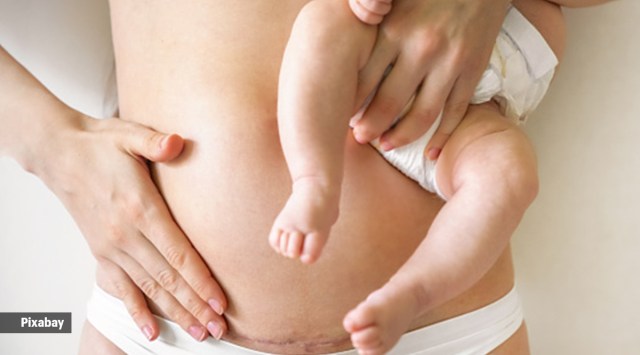📣 For more lifestyle news, click here to join our WhatsApp Channel and also follow us on Instagram
Post-pregnancy care: Effective tips for a faster C-section recovery
Caesarean delivery is usually preferred when a vaginal delivery is unsafe to perform or can affect the health of the baby and mother.
 You may need a C-section if you are facing certain medical conditions or complications during vaginal delivery. (Source: Freepik)
You may need a C-section if you are facing certain medical conditions or complications during vaginal delivery. (Source: Freepik)Caesarean section or C-section is a procedure in which a baby is delivered through surgical incisions made in the abdomen and uterus. “It is usually preferred when a vaginal delivery is unsafe to perform or can affect the health of the baby and mother,” said Dr Jagriti Varshney, a gynaecologist and obstetrician.
According to the expert, a woman may need a C-section if she is facing certain medical conditions or complications during vaginal delivery, such as:
*Your baby’s head or body is too large
*Expecting multiple babies
*The baby is in a sideways position
*Your baby’s feet come out first
*Umbilical cord is looped around the baby’s neck
In such a case, it also becomes important for a woman to take special care of her health after a C-section. As such Dr Shruti Sharma, a gynaecologist, shared some important tips on Instagram:
View this post on Instagram
*Stay active with daily walks to prevent blood clots, recover your mental health, and help with blood circulation in the body.
*Avoid constipation by staying well-hydrated, avoid straining when opening your bowels by allowing plenty of time, put your feet on a stool and let gravity do its work.
*Keep the wound clean and dry, and exposed to the air when possible. If you have an overhang, then some gauze can be placed in the skin fold to keep it dry. On similar lines, Dr Varshney recommended mothers to wear loose and cotton clothing.
*If breastfeeding, use a supportive pillow or a lying-down technique to reduce your need for bending and twisting. Explaining the same, Dr Varshney said, “If the mother develops breast tenderness or soreness, they should consult a gynaecologist. It could be a result of not properly breastfeeding and can lead to certain bacterial infections, such as mastitis.”
*Take painkillers regularly for the first 7 days, even if the pain improves! That way you are always covered and don’t have to wait for painkillers to take effect when pain returns.
Adding to this, Dr Varshney advised to not go for over-the-counter painkillers as they might have harmful substances, which can get secreted with the breast milk and lead to complications. “Your gynaecologist can prescribe you certain painkillers that are safe during postpartum time, such as paracetamol and ibuprofen,” she said.
*See your gynaecologist if you have a fever, increasing pain, discharge from the wound or other concerns.
Concluding, Dr Varshney said, “It is advisable to avoid some activities such as driving, climbing a lot of stairs, sexual intercourse, and lifting heavy weights up to six weeks of postnatal period.”
📣 For more lifestyle news, follow us on Instagram | Twitter | Facebook and don’t miss out on the latest updates!
📣 For more lifestyle news, click here to join our WhatsApp Channel and also follow us on Instagram






- 01
- 02
- 03
- 04
- 05





















